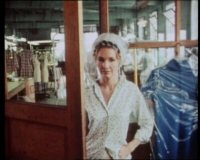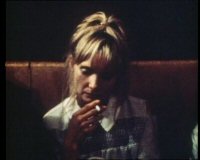Wanda (Barbara Loden, 1971)
 The first and only film from director
Barbara Loden, Wanda is a largely
forgotten drama that uses improvisational technique and a documentary-like
approach to tell a tale of one woman’s drift to the fringes of society. Set
mostly in small-town Pennsylvania, the movie centers on Wanda, an unemployed
ex-housewife who assumes into a drifter’s life for reasons that aren’t quite
made explicit. Loden, an actress and the wife of director Elia Kazan, plays the
lead without any artifice or vanity, making her character’s glazed-over anomie
her defining characteristic. Significantly, the viewer never sees her at home,
only hearing her husband’s accounts of how badly she did while she was there.
This drives home the feeling that she’s already lost all moorings and
nullifies any hope of reconciliation. A court appearance, in which she gives up
custody to her children and grants her husband a divorce, provides her
opportunity to offer up a defense for her actions, but she fully acquiesces to
her husband’s demands and low opinion of her before walking away from the life
that she’d known. Watching as Wanda drifts from one coal town to another,
attaching herself to whoever will have her, it might be tempting to read her
shirking of the roles of mother and wife as a feminist move. Loden is careful to
never suggest anything so deliberate on Wanda’s part, though. Although she
might appear to be a free woman, she is best described as meek and clearly still
has emotional dependencies that bind her to others.
The first and only film from director
Barbara Loden, Wanda is a largely
forgotten drama that uses improvisational technique and a documentary-like
approach to tell a tale of one woman’s drift to the fringes of society. Set
mostly in small-town Pennsylvania, the movie centers on Wanda, an unemployed
ex-housewife who assumes into a drifter’s life for reasons that aren’t quite
made explicit. Loden, an actress and the wife of director Elia Kazan, plays the
lead without any artifice or vanity, making her character’s glazed-over anomie
her defining characteristic. Significantly, the viewer never sees her at home,
only hearing her husband’s accounts of how badly she did while she was there.
This drives home the feeling that she’s already lost all moorings and
nullifies any hope of reconciliation. A court appearance, in which she gives up
custody to her children and grants her husband a divorce, provides her
opportunity to offer up a defense for her actions, but she fully acquiesces to
her husband’s demands and low opinion of her before walking away from the life
that she’d known. Watching as Wanda drifts from one coal town to another,
attaching herself to whoever will have her, it might be tempting to read her
shirking of the roles of mother and wife as a feminist move. Loden is careful to
never suggest anything so deliberate on Wanda’s part, though. Although she
might appear to be a free woman, she is best described as meek and clearly still
has emotional dependencies that bind her to others.
 This tendency is made apparent in the
second half of the film, in which Wanda all but forces herself onto Mr. Dennis,
a petty criminal who, under his gruff exterior, turns out to have complimentary
needs. From this point, Wanda turns
out to be one of the more perceptive studies of co-dependence that I’ve seen.
Their relationship escalates to the point where she’s assisting him in
a bank heist, but that sequence is staged with such an obvious sense of doom
hanging over it that it never feels as if Loden is glamorizing the crime.
Instead, crystallizes the troubles that the two have exhibited to that point.
Mr. Dennis’ attempt to give his dismissive father stolen money is only the
most blatant moment that demonstrates his despondency. His relationship with
Wanda plays out as a series of morbidly funny scenes where Wanda subjects
herself to abuse from her disrespectful new lover (“When you’re with me, no
slacks!” he yells as he tosses her new pants out the window of a speeding
car.). Affection appears to be the
exception in her affairs, and she’s sadly accepted that fact. The eventual
bank heist is as much a dysfunctional long-shot as their relationship has been.
As such, Wanda is rather out of step
with the other, more famous, lovers-on-the-run films of the period such as The
Sugarland Express, Badlands, Thieves Like Us and Bonnie and
Clyde. Each of those movies achieves a heady rush, even if only an aesthetic
one, from the crimes that its characters commit. Such a countercultural thrill
would feel like a cheat in Wanda’s stripped-down scheme.
This tendency is made apparent in the
second half of the film, in which Wanda all but forces herself onto Mr. Dennis,
a petty criminal who, under his gruff exterior, turns out to have complimentary
needs. From this point, Wanda turns
out to be one of the more perceptive studies of co-dependence that I’ve seen.
Their relationship escalates to the point where she’s assisting him in
a bank heist, but that sequence is staged with such an obvious sense of doom
hanging over it that it never feels as if Loden is glamorizing the crime.
Instead, crystallizes the troubles that the two have exhibited to that point.
Mr. Dennis’ attempt to give his dismissive father stolen money is only the
most blatant moment that demonstrates his despondency. His relationship with
Wanda plays out as a series of morbidly funny scenes where Wanda subjects
herself to abuse from her disrespectful new lover (“When you’re with me, no
slacks!” he yells as he tosses her new pants out the window of a speeding
car.). Affection appears to be the
exception in her affairs, and she’s sadly accepted that fact. The eventual
bank heist is as much a dysfunctional long-shot as their relationship has been.
As such, Wanda is rather out of step
with the other, more famous, lovers-on-the-run films of the period such as The
Sugarland Express, Badlands, Thieves Like Us and Bonnie and
Clyde. Each of those movies achieves a heady rush, even if only an aesthetic
one, from the crimes that its characters commit. Such a countercultural thrill
would feel like a cheat in Wanda’s stripped-down scheme.
 Blown-up from a 16mm negative, the look
of Wanda is grainy and naturalistic. The visuals are a good match for
Wanda’s undiagnosed depression. The scenery is never breathtaking or even
especially noteworthy. Everything blurs together, and scenes feel somewhat
shapeless, despite storytelling disciplined enough to ensure that none of them
are insignificant. Also, thankfully, the film never comes off as a rambling
actors’ exercise, despite the relatively simplistic narrative path it charts.
Loden is more critical of her characters than most directors of Cassavetes-like
films, steadfastly refusing to give the audience the feeling that we should
admire the titular character simply because she’s trying the best that she
can. Though Loden clearly sympathizes with her protagonist, her portrayal of the
woman is so passive that she’s impossible to be perceived as a figure to rally
behind. The scene where Wanda loses her job is a perfect example of this
ambivalence. Though the moment is unfortunate because it severs yet one more tie
between Wanda and normality, it’s not exactly surprising when a male employer
tells her that he has no work for her beyond the two-day shift that she’s
already done. She hardly strikes the viewer as a motivated individual. Loden
doesn’t need to make the man in power chauvinistic to make a point about
Wanda’s ingrained passivity or his unthinking ability to dismiss her.
Remarkable as a first film because of the maturity that it shows, Wanda
resists rashly judging its characters, but just as adamantly withstands the
temptation to give them a free pass. It’s this kind of intelligence that helps
Wanda to rise above the myriad films of its ilk from its era.
Blown-up from a 16mm negative, the look
of Wanda is grainy and naturalistic. The visuals are a good match for
Wanda’s undiagnosed depression. The scenery is never breathtaking or even
especially noteworthy. Everything blurs together, and scenes feel somewhat
shapeless, despite storytelling disciplined enough to ensure that none of them
are insignificant. Also, thankfully, the film never comes off as a rambling
actors’ exercise, despite the relatively simplistic narrative path it charts.
Loden is more critical of her characters than most directors of Cassavetes-like
films, steadfastly refusing to give the audience the feeling that we should
admire the titular character simply because she’s trying the best that she
can. Though Loden clearly sympathizes with her protagonist, her portrayal of the
woman is so passive that she’s impossible to be perceived as a figure to rally
behind. The scene where Wanda loses her job is a perfect example of this
ambivalence. Though the moment is unfortunate because it severs yet one more tie
between Wanda and normality, it’s not exactly surprising when a male employer
tells her that he has no work for her beyond the two-day shift that she’s
already done. She hardly strikes the viewer as a motivated individual. Loden
doesn’t need to make the man in power chauvinistic to make a point about
Wanda’s ingrained passivity or his unthinking ability to dismiss her.
Remarkable as a first film because of the maturity that it shows, Wanda
resists rashly judging its characters, but just as adamantly withstands the
temptation to give them a free pass. It’s this kind of intelligence that helps
Wanda to rise above the myriad films of its ilk from its era.
73
10-25-04
Jeremy Heilman